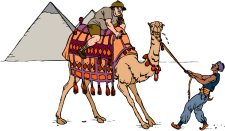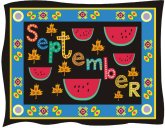Monday, 16 May 2005
Buy Me A Camel!
Topic: In the News

No, I'm not joking. You can really buy me a
camel for just #95! Oxfam Great Britain has just launched their summer, '
Unwrapped Gift Catalogue', with a range of gifts which will be available until the end of September. Of course, I wouldn't actually get the camel, just a card! No, these are gifts in support of Oxfam's humanitarian work and they will benefit a community in one of over 70 countries, thereby helping Oxfam to tackle worldwide poverty and suffering. What a brilliant idea for that awkward person who seems to have everything - now you can give them a marvellous present and benefit a charity at the same time. If you are that 'awkward person', then get a gift catalogue from Oxfam for your friends and family to browse through.
The gift choices range from camels, cows and goats to a whole farmyard of livestock for #1,200. If you don't want to buy an animal, you can purchase school dinners for 100 children for just #6, fill a satchel with school equipment for just #16, buy medicines for a whole village for #100 or provide safe water for 1000 people for #720.
If you are getting married, Oxfam now offer an Unwrapped 'Wedding List' Service as well. Personalised wedding lists can easily be created after you have registered
here. If you already own that microwave oven, coffee maker, food mixer, or whatever and you are stuck for wedding gift ideas - why not give this a try?
In the meantime, if you are feeling generous, I would really, really, like a camel!
N.B. My grateful thanks to Oxfam GB (tel: 0870 333 2700) for permission to use their small camel picture
Updated 16 May 2005 17:17 BST
Amazing Animals: The Camel
(No. 2 in my series)
Topic: Nature and Our World

I was quite young when I had my first encounter with a camel. My sister, Janine, had taken me to
London Zoo and we spotted the 'Camel Ride' - I eagerly joined the long queue. Oh, yes, please... I want to wait, I told my sister. It was a huge creature, a Bactrian Camel with two humps, thick, long shaggy ruddy-brown hair and enormous feet. The 'seat' was one of those contraptions with two benches suspended laterally and seating several children on each side of the camel's humps. It was a very long wait but finally I got to the front of the queue, standing eagerly by the steps ready to climb up onto the bench seat. At last the camel returned and its passengers climbed down. I can still feel my trembling excitement when I was suddenly whisked up into the air by the Keeper and, because I was so small, placed not on the bench seat, but on the camel's neck! I could see where we were going; I could touch its hair. I was riding a camel!
Many years' later, when I was twenty-three, I visited the
Land of the Pharaohs and had my second encounter with a camel - an Arabian camel, this time, with one hump. Its days were taken up patiently transporting countless tourists the short distance to that crumbling wonder of the ancient world,

the
Great Pyramid of Khufu (Greek name Cheops). Never having had much to do with horses, I took to riding the camel straight away. The camels are taught to kneel down, as it much easier to climb on. However, I knew that once up there, you had to be very careful when they got up! You see, they raise their back legs first and then, when they kneel down again, they go down on their front knees first so, I made sure I was leaning right back. (I did see one tourist fall off!) I also knew, probably from seeing that epic film, "
Lawrence of Arabia", that you should hook your right foot behind your left knee - it certainly felt much more secure. The camel has a strange, rather pleasant, swaying gait when walking because its left front and back legs move together followed by its right front and back legs - no wonder it was called the 'ship of the desert'!
The two-humped Bactrian Camel (
Camelus bactrianus)is found throughout Asia, mainly in Mongolia and in China. A very small number of protected wild herds still roam the grassy Steppes and the Gobi Desert. Their extra long hair protects them from the extremes of temperature and they have shorter legs and thicker bodies than the one-humped Arabian camel (
Camelus dromedarius), which is found in the Middle East and in Africa. There are no wild herds of Arabian camels in North Africa as, when the animal was first domesticated some 5,000 years ago, their wild cousins died out.
And, yes, they are the most amazing of creatures; both types of camels are perfectly adapted to the desert environment. They carry a reserve of fat in their humps and can go for long periods without water, particularly if leafy plants are available. Although they are not true ruminants, their stomachs are divided into three sections and they swallow food whole then regurgitate it later to chew the cud. Camels don't pant and they perspire very little as they have a large body temperature range, which can fluctuate between 93?F (34?C) in the early hours of the morning to 105?F (41?C) or more by midday, without causing them distress. They just 'cool off' overnight when the desert temperature drops. This unique 'body thermostat' allows them to conserve body fluids and avoid unnecessary water loss. In addition, their kidneys can concentrate their urine, which can become as thick as syrup and twice as salty as seawater! They also extract fluid from their faeces and their pellets are so dry they can be used immediately for fuel.
Camels can go 5-7 days with little or no food and water and can easily lose a quarter of their body weight or more without suffering any consequences. Blood plasma volume is maintained as, when necessary, water stored in body fat and other tissues can be extracted. This lost water can be rapidly replaced and a large animal can drink as much as 100 litres/21 gallons of water, even brackish water, in ten minutes. This would cause severe problems in other animals, but the camel's unique metabolism enables it to store the water in its bloodstream. Camels are the only mammals with oval (instead of circular) red blood cells. This adaptation allows the red blood cells to continue to circulate if the blood thickens and to expand and not rupture when the camel takes in large quantities of water.
Some other physical characteristics which allow camels to survive so well in arid desert conditions include a double row of beautiful long eyelashes that protect their eyes from wind-blown sand; small ears lined with fine hairs, also to keep out sand; nostrils that can be closed; thick lips and 34 sharp teeth to eat coarse, thorny desert plants; and two-toed feet which have vestigial hoofs that look like nails and a broad calloused pad to walk on hot sand. And, I promise you, desert sand can get
very hot indeed around midday,
never step on it barefooted as I once did when I came out of a shrine carrying my sandals!
Certainly, without the camel, the desert peoples would never have flourished. They provide transport, shade, milk, meat, wool and hides - the
Bedouin call it,
Ata Allah, (God's gift). Camel milk is actually highly nutritious and lower in fat and lactose than milk from a dairy cow. The much-prized riding or racing camel, the equivalent of a pedigree racing horse, is called the Dromedary.
Camels live for up to 40 years and their gestation period is 13 months, so females only breed every two years. Calves weigh about 90 pounds at birth and take about five years to mature. All the Camelidae family evolved in North America, where they eventually became extinct approximately 12,000 years ago. However, before the ice ages, some of the early ancestral camels crossed the Alaskan land bridge (Bering Strait) to Asia and others the Panama land connection to South America. Therefore the Bactrian and Arabian camels are closely related to the
South American Llama and alpaca, vicuna and guanacos. All the South American camelids can be interbred and selective breeding can greatly improve the quality of their wool. Likewise, the Dromedary and Bactrian camels are very similar to each other and can be
crossbred to produce faster, stronger hybreds. All hybred offspring are fertile.
Saturday, 14 May 2005
Looking After Your Teeth
Topic: Health Issues
I see that a recent
study by British researchers has found that only up to one-third of people diagnosed with gum disease, actually follow the advice given to them by their dentists. If only they knew the problems that could arise from poor dental hygiene - do you? How often do you brush your teeth and for how long? If you own an electric toothbrush, it should be one of those which has a two-minute timer. It is! Good - dentists recommend that you brush your teeth for at least two minutes at a time. But - when did you last buy a new head for your electric toothbrush, or a new toothbrush, if you don't have an electric one? Aaah, I thought so! What is it with us British? We will happily fork out loads of money for a meal out, for a theatre seat, for designer clothes, for a holiday, for music cds and countless other things, but not for that new toothbrush. A flattened toothbrush head, electric or otherwise, such as the one I saw in someone's bathroom recently, is COMPLETELY USELESS for cleaning in between your teeth!
Another thing, do you clean your teeth with an up and down motion or do you scrub horizontally like my grandchildren tend to do? If I leave them to it, the whole tooth-cleaning process takes just about 30 seconds with a quick scrub and one rinse - despite the advice of the Tooth Fairy! I reiterate the importance of cleaning teeth properly and try to brush their teeth for them. However, two minutes is completely impossible as they don't keep still for that long! Luckily, it is only once a week that Grandma has the job - I just hope my daughter does it better!
I remember seeing a television interview with the film star,
Jim Carrey some while back. He was asked about his teeth and treated viewers to an enormous, dazzling, smile. His teeth are PERFECT - and all his own. He flosses. All Americans are more conscious of oral hygiene than we British, it seems. Flossing is very important as it helps to remove plaque, that sticky deposit which can harden into tartar (calculus) on the backs of our teeth and work its way down in between the teeth and the gums. Plaque is full of bacteria and toxins which irritate the gums and which, if left, will break down the tissue
and the bone that supports your teeth. Eventually, your teeth can become so loose, they have to be removed.
If your gums tend to bleed a little when you brush your teeth, you probably have Gingivitis, the mildest form of gum disease. Did you know that periodontal disease is now thought to be a contributing facture to complications in pregnancies, such as
preeclampsia? It may also be a risk factor for low birth weight and premature births and also for cardiovascular disease. Although further studies are needed, it's just not worth taking the risk, is it? So, do you floss? Do I floss?! Well, when I remember - but I am trying very hard to do it more often! Ideally, you should do it every day. I recently bought some of those floss sticks with a 'gum stimulator' at the other end, you know, the one's that look a bit like a miniature version of a child's y-shaped toy catapult. They are very easy to use - until I got one trapped in between one of my back teeth. "Oh, *bleep*!" - (I once pulled out part of a filling with some dental floss!) Thank goodness I had some small scissors in the bathroom cupboard!
When my mother was in her forties (I think) she was told by the dentist that her gums were diseased, "
You have pyorrhoea" (periodontitis), was the diagnosis. "
Your teeth will have to come out!", was the verdict. And come out they came, there and then, ALL of them, before she could even think about it! Whether it was severe inflammation or not, no treatment for the cause was suggested in
those days, other than removal! (If you ever wondered as a child why so many elderly people seemed to have false teeth, now you know). A full plate of false teeth is not to be recommended! I remember something my poor old Dad once did; he had an uncomfortable top plate which he would put off wearing until meal times. One day, he caught the early train up to London; he was meeting someone for a business lunch. And, yes, he forgot to put his teeth in! I found them still sitting in a glass in the bathroom and my Mum confirmed they were indeed his! I don't think he enjoyed his meal very much despite trying to order the softest food on the menu!
These are the top tips for looking after your teeth. So, unless you really want to have false teeth and clean them over-night in a glass - ignore them at your peril:-
- Brush your teeth twice a day, for two minutes, with fluoride toothpaste
- Avoid eating sugary food, particularly between meals
- Clean between your teeth, using floss or a mini/interdental toothbrush
- Stop smoking
- Take professional advice about looking after your teeth
- Chew sugar-free gum, particularly those containing the sweetener xylitol, after meals to protect teeth from decay
Using an antiseptic mouthwash each day can also to help prevent gum disease.
We often chew sugar-free gum after our evening meal. However,
never give anyone with false teeth or a partial plate, chewing gum to chew! Out of politeness, I once offered a stick of gum to a visitor (my eldest sister, actually). Oh dear! I saw her nibble a bit off the end - she had never encountered chewing gum before. "It's not candy, you can't swallow it", I gasped. Well, to cut a long story short, the gum stuck all over her plate. It took her a good twenty minutes in the bathroom trying to remove it all! And, you know how chewing gum can stick to the fingers! — They should put a warning on chewing gum packets!
Thursday, 12 May 2005
What's In A Name?
Topic: Miscellanea
Shakespeare wrote: What's in a name? That which we call a rose, by any other name would smell as sweet (Romeo and Juliet). Yes, it would. But what about the names people give their children? What do you feel about your own name (I hate mine - especially Thérèse!) Are names important? Do they have an effect on how a child thinks about himself or herself?
What started me musing about names was finding out that
Florence Nightingale, who was born on 12th May 1820, was named Florence because she was born in Florence in Italy. Fine, nothing wrong with her name. But did you know that her elder sister, who was born in Naples, was called Parthenope - the Greek name for that ancient city? What a good job Florence's parents weren't visiting Reykjavik or Bratislava when she was born!
Many famous people give their children quite ridiculous, almost cruel, names. What effect does it have on a child to be called "Moon Unit", "Ahmet Emuukha Rodan", "Dweezil", or "Diva" (
Frank Zappa's children) or "Inspektor Pilot" (actor
Jason Lee's son)? Will they change their names one day? Free Carradine (son of David) changed his name to Tom.
Bob Geldorf's daughters are called Fifi Trixibelle, Peaches Honeyblossom and Pixie whilst their half-sister is called Heavenly Hiraani Tigerlily! What happended to
Christian names, for heavens' sake! I mean, would you like to be called "Apple" (Gwyneth Paltrow) or "Speck Wildhorse" (John Mellencamp)?
Many people give their children a 'flower' name; Rose, Daisy or Lily are fine examples. But my husband, who used to deal with teachers' records, once came across two teachers, spinster sisters, called Fuchsia and Edelweiss. Original names they may have been but they don't exactly flow off the tongue. Were they teased as children (the idle one?), I wonder!
Do you think a name can influence what you become? Take the names of Red Indian Chiefs,
Sitting Bull, (Tatanka Iyotanka) for instance. Would he have risen to be a Hunkpapa Lakota Sioux leader if his name had been 'Grey Mouse'? Would
Crazy Horse (Tashunca-uitco) of the Oglala Sioux have made it if his name had been 'Lame Duck'. Well, almost certainly they would have, but it is an interesting thought, nonetheless!
Wednesday, 11 May 2005
Salvador Dali (1904-1989)
Topic: Music and Art

I don't know a great deal about art, but I do know when I like a picture. When I was twelve or so, I can remember buying a small print of this painting of the Crucifixion and hanging it over my bed. I don't think I knew who had painted it at the time or what it was called but it certainly caught my eye. Later, I learnt that it was the work of the Spanish painter,
Salvador Dali. He called it "Christ of St John of the Cross" and it was painted in 1951 during his more classic period.
Salvador Felipe Jacinto Dali y Domenech was born on the 11th May 1904, in Figueras, Catalonia, Spain. He was really quite eccentric in his dress and appearance, with a big, swirling moustache. In his twenties, he became extremely interested in Sigmund Freud's ideas on subconscious imagery and learnt how to induce in himself a 'hallucinatory state' (a form of clinical paranoia!) in order to paint his bizarre dreamlike images. In 1929, he joined the Surrealist Movement but was eventually expelled from their ranks in 1937, when his paintings became more traditional in style.
Yes, I would call him a mad genius but he was truly a gifted artist with enormous talent and produced many brilliant works in his lifetime. He died on 23rd January 1989.
Monday, 9 May 2005
Reaping Your Reward
Topic: Memories
Watching all those nostalgic memories of war-time Britain on the television last night, made me think of how we coped with food rationing; I know my parents did without many things themselves. I can remember my mother reminiscing about the war when she was old and frail - she was telling me about one of my older sisters who had complained about the shortage of butter. So, my mother said, she divided the butter allowance into little individual dishes labelled for everyone. My sister soon realised she had been eating my mother's ration too! I can remember my sister once giving me a bottle with the cream from the milk in it. I had to shake it up and down for ages to 'make some butter'! I don't think the resulting 'solid' tasted particularly good!
Now, my mother was a very kind and generous person, perhaps too much so. But one particular kindness was amply rewarded during the years of wartime rationing. For several years before the war, a blind man had been coming round each week with his little trolley selling bags of sugar at the door. My mother felt very sorry for him and had a regular order of (I think) two packets a week - 4lbs of sugar. She knew he relied on his few customers to augment his tiny pension. The problem was that my mother did not use anywhere near that amount of sugar each week but she was too kind to tell the blind man that she wanted to cancel her order! I have no idea what my father thought about it or whether he even realised that one of the enormous kitchen cupboards, which had deep shelves up to the ceiling, was gradually getting stacked with hundreds of bags of sugar! I can still remember, as a toddler, seeing four or five shelves of row upon row of sugar bags. I was born at the end of 1941 so, goodness knows how many were there when the war started.
Well, when war was declared, the poor blind man stopped coming. Rationing was introduced. You were allowed something like 8oz of sugar a week - not much if you put sugar in your tea and made puddings. It certainly made it impossible for the normal housewife to bake large cakes or preserve the fruit from her garden. Well, not for my mother! And she was able to supply the lady next door with sugar in return for lovely, fresh eggs from the hens she kept at the bottom of the garden! She would also give her neighbour potato peelings to feed those chickens. Nothing was wasted during the war. In addition, my mother gave bags of sugar to neighbours and friends as presents - they were always absolutely delighted - and sometimes we got something in exchange from their gardens.
After the war ended, food rationing for many items, including sugar, continued for several years. I have a vivid memory of winning third prize in the summer raffle at school one year. I must admit I wasn't too pleased with my cornflake box full of cooking apples but I remember well my mother's exclamation of great joy when she opened the back door to me and saw what I was carrying! We had stewed apples for tea that day.
Yes, God does sometimes reward real kindness in this life!
Sunday, 8 May 2005
"The German war is at an end"
Topic: Anniversaries
Today is the anniversary of the declaration of 'Victory in Europe'. I was three years old when Churchill spoke to the nation sixty years ago today. I probably heard his speech - but I don't remember. I can remember hearing the sound of the Air Raid sirens, (
'La musique qui pleure', I called it), and I can remember hearing doodle bugs. But, I have no real memories of my family's reaction to the end of the war or whether there was a street party in our road. In any case, my parents would have been very anxious for news from our relations in France, Belgium and Luxembourg.
For those who have not lived through a conflict, it is difficult to imagine the horror and the utter futility of war. However, the essence of this realisation is often caught and put into words by a poet. I was looking for a poem written to celebrate the end of the war, I felt sure someone must have written one. Perhaps the Poet Laureate - but, who was the Poet Laureate in 1945? Instead I found a poem called, "If We Break Faith". It actually describes the signing of the armistice ending Word War I but also anticipates the ending of World War II. It was written by a little known American Poet, Joseph Auslander. He was America's first 'Consultant in Poetry to the Library of Congress' from 1937 to 1941 (a post later called Poet Laureate Consultant). Here it is:
If We Break Faith
When they write an end to war, when they blot away the battle,
While our hearts are hushed in thankfulness and prayer,
With the signatures still wet, Lord, let us not forget
The ghostly line who also sign, though no one sees them there.
They crowd into that railroad car, they throng that flagship’s cabin –
The ghosts of all the dead men in long unending lines:
From the hell-defended rock, from the hallowed beachhead flock
The dead who stand and grip his hand each time the signer signs.
If we break faith with these our dead, play fast and loose with honor;
If we once more betray them as we have betrayed them twice,
We have earned their bitter curse that shall blast the universe ....
Judge Thou us then, O Judge of men, if we deny them thrice!
Amen.
Original found here
Saturday, 7 May 2005
Living Longer?
Topic: Health Issues
I heard a schoolgirl being interviewed on the BBC News last night. She said she expected to work until she was 65 years old and that she wanted to live to be one hundred! Apparently, more and more people are living longer in the 21st century and there are around 7,000 centenarians in Britain today. Of course, how long you are likely to live depends on your lifestyle, your diet and your weight. My BMI (body mass index) is way too high and, according to the BBC's
Life Expectancy Calculator, I shall probably make it to 89.8 years old! If I lose some weight, I might even live a bit longer!
Advances in medicine, good food and less of the backbreaking physical drudgery our great-great-grandparents took for granted has improved the quality of our lives. We have more time to relax, to play and to go on holidays - so on average we have been living much longer than our ancestors did. However, in recent years, it appears that this upward trend is being
reversed in certain areas with Glaswegians, for instance, having an average life expectancy of 72.9 years compared to Londoners with 82.4 years. This report, published in the British Medical Journal by the Universities of Bristol and Sheffield, blames discrepancies in health services and the gap between the poor and the wealthy.
I distrust statistics, they can be bent in any direction to prove whatever you think is the problem. Have the 'researchers' also analysed the differences in lifestyles before blaming the beleaguered Health Service? Have they compared the differences in life expectancy between Glasgow and the affluent south today from what existed a 100 years ago? Have they taken into account the much colder winters in Glasgow compared to those in Devon where the life expectancy is apparently 11 years longer? What about crowded and stressful living conditions? What about air quality and pollution? Being wealthy does not exonerate you from having health problems nor does it guarantee that you eat well-balanced fresh meals! Yes, if you are retired in Devon, you probably live in a roomy, beautiful cottage with a large peaceful garden, with no squabbling neighbours to add stress to your life. Nevertheless, whatever, our 'affluence', if we spend every evening stuck in an armchair watching television; if the only exercise we do is to extend an arm to pick up a can of beer or to press the remote; if we feed on 'takeaways' because we can no longer be bothered to cook fresh, healthy meals; then we
will die younger.
Yes, I agree - poverty in Great Britain today
is a problem, particularly if you cannot keep warm enough in the winter, but it is a far cry from the poverty of the 18th and 19th centuries when it was not uncommon for people to starve to death in the street and many children were forced to go barefoot. In fact, Britain was far more healthy during the years of
rationing, during and after World War Two, when nearly everyone managed to grow some fresh fruit and vegetables in their gardens to supplement the food coupons that were so precious. So that says something about our modern lifestyles and the poor quality of the unhealthy processed foods most of us stuff into our mouths these days.
Whatever the gloom and doom, the statistics for the 1880's show that life expectancy a hundred and twenty-five years ago was shockingly low. I came across this short paragraph in "The Boy's Own Annual", a sadly tattered book my father passed on to me in my youth. It consists of issues of the "Boy's Own Paper" from October 1881 to September 1882 and this entry was originally printed in issue No. 144-Vol. IV for Saturday, October 15, 1881. It seems that, even then, a happy, healthy life was conducive to living longer!
| Duration of Human Life |
|---|
The average of human life is 33 years. One quarter die before the age of 7, one half before the age of 17. To every 1,000 persons, 1 only reaches 100 years. To every 100, only 6 reach 75 years; and not more than 1 in 500 will reach 80 years. There are on the earth 1,000,000,000 of inhabitants. Of these, 33,333,333 die every year; 91,824 die every day ; 7,780 every hour; and 60 per minute, or 1 every second. These losses are about balanced by an equal number of births. The married are longer lived than the single: and above all, those who observe a sober and industrious conduct. |
Postscript Worldwide
life expectancy continues to rise but the continent with the lowest life expectancy is Africa with some Sub-Saharan countries actually experiencing a decline. The
data tables on the DEPweb (Development Education Program)show that in 1998 Sierra Leone had the lowest life expectancy of 37 years compared to 41 for Nigeria; 42 for Burundi, Malawi and Uganda; and 43 for Ethiopia. The highest life expectancy was 81 in Japan; 79 in Australia, Austria, Canada, Hong Kong, Sweden and Switzerland.
Updated Saturday, 7 May 2005 15:19 BST
Thursday, 5 May 2005
Percy Heath (1923-2005)
Topic: Music and Art
It was Milt Jackson who wrote the tune, "Ain't But a Few of Us Left", which he recorded in 1981 on a
CD of that name with Oscar Peterson, Ray Brown and Grady Tate. A jazz vibraphone player, Milt "Bags" Jackson was the founder of the Milt Jackson Modern Jazz Quartet which eventually became known as the MJQ under the leadership of pianist, John Lewis. "Bags" was acutely aware that only a few giants remained from the time when jazz music was at its pinnacle. He died in 1999 and John Lewis died in 2001. Connie Kay, the drummer for the MJQ, died in 1994.

Now I see that yet another 'giant' has passed on,
Percy Heath, the bassist with the Modern Jazz Quartet for many years. Percy died last Thursday, 28th April 2005, aged 81 - just two days' short of his 82nd birthday. He had been suffering from bone cancer.
Although they did reunite in the 1980s, "
The Last Concert" of the MJQ was recorded on 25th November 1974. If I could only keep one out of our collection of Jazz CDs, it would be this one. They gave of their very best with Percy Heath giving
two of the most extraordinarily cohesive and marvellously balanced bass solos ever heard on that night. May he rest in peace.
Laptop Perversity!
Mood:
 don't ask
Topic: Computer
don't ask
Topic: Computer
I can see Jeremy Clarkson smashing a computer with a hammer in that television series, "
Inventions that Changed the World". Well, right now, I feel like doing
exactly the same thing to my machine!! Grrrrr... There I am creating a new entry for this blog. Three other windows open whilst I do some research and look for links. At the same time, I am consulting medium-sized tome. Getting on like a house on fire. Then, muggins, leans book against front edge of laptop computer. Arrgghh... Frozen keyboard. WHY DOES THAT HAPPEN?
I know, I know, I can hear
Michael Winner telling me to, "Calm down, dear!" — think I'll go to bed and start again in the morning.
Newer | Latest | Older
 No, I'm not joking. You can really buy me a camel for just #95! Oxfam Great Britain has just launched their summer, 'Unwrapped Gift Catalogue', with a range of gifts which will be available until the end of September. Of course, I wouldn't actually get the camel, just a card! No, these are gifts in support of Oxfam's humanitarian work and they will benefit a community in one of over 70 countries, thereby helping Oxfam to tackle worldwide poverty and suffering. What a brilliant idea for that awkward person who seems to have everything - now you can give them a marvellous present and benefit a charity at the same time. If you are that 'awkward person', then get a gift catalogue from Oxfam for your friends and family to browse through.
No, I'm not joking. You can really buy me a camel for just #95! Oxfam Great Britain has just launched their summer, 'Unwrapped Gift Catalogue', with a range of gifts which will be available until the end of September. Of course, I wouldn't actually get the camel, just a card! No, these are gifts in support of Oxfam's humanitarian work and they will benefit a community in one of over 70 countries, thereby helping Oxfam to tackle worldwide poverty and suffering. What a brilliant idea for that awkward person who seems to have everything - now you can give them a marvellous present and benefit a charity at the same time. If you are that 'awkward person', then get a gift catalogue from Oxfam for your friends and family to browse through. 




 I was quite young when I had my first encounter with a camel. My sister, Janine, had taken me to
I was quite young when I had my first encounter with a camel. My sister, Janine, had taken me to  the
the  I don't know a great deal about art, but I do know when I like a picture. When I was twelve or so, I can remember buying a small print of this painting of the Crucifixion and hanging it over my bed. I don't think I knew who had painted it at the time or what it was called but it certainly caught my eye. Later, I learnt that it was the work of the Spanish painter,
I don't know a great deal about art, but I do know when I like a picture. When I was twelve or so, I can remember buying a small print of this painting of the Crucifixion and hanging it over my bed. I don't think I knew who had painted it at the time or what it was called but it certainly caught my eye. Later, I learnt that it was the work of the Spanish painter,  Now I see that yet another 'giant' has passed on,
Now I see that yet another 'giant' has passed on,